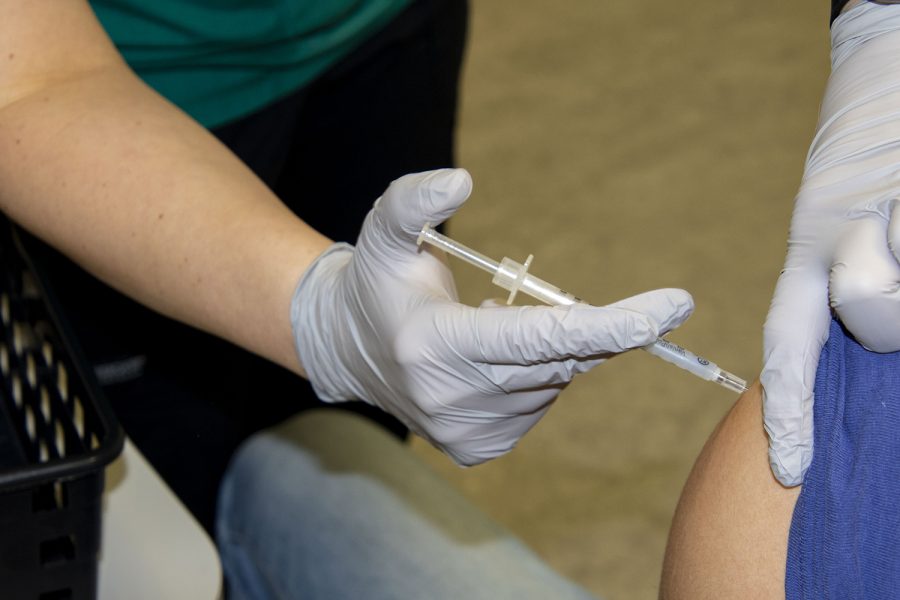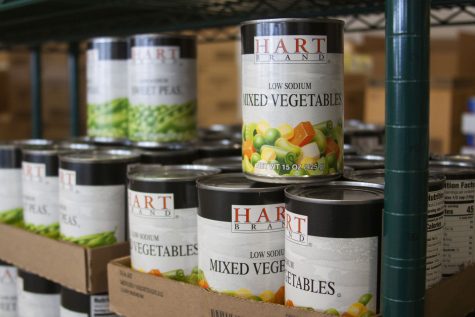Opinion | Restaurant workers are being neglected in Iowa’s COVID-19 vaccine process
Iowa skips vaccinating once-essential workers amid weakened protections.
U of Iowa students given first round of vaccinations on Thursday, Jan 28, 2021. A medical student receives the Moderna vaccine.
March 3, 2021
Iowa officials are serving up a steaming plate of hypocrisy. At the start of the pandemic, restaurant employees and other food service workers were considered essential, but these once-necessary workers are left behind as Iowa rolls out the vaccine.
The Iowa Department of Public Health announced the current phase of COVID-19 vaccine distribution will include essential agriculture and food production workers but not employees in the restaurant and food service industry.
Though the vaccine is in high demand, Iowa should support food service employees just as much as other essential workers.
Iowa’s reliance on restaurants throughout the pandemic established a responsibility to prioritize food and dining staff when distributing the vaccine. The state’s categorization of restaurant employees as essential, along with limited unemployment coverage, forced many to return to work amid unsafe conditions.
Now when it’s time to actually protect these “essential” employees, Iowa balks.
Max Halverson, a senior at the University of Iowa, has worked as a server at Vue since early August. Halverson said he was excited to learn that food and agriculture workers were included in phase 1B, but later discovered that he would not qualify.
“If people want to go out and have a drink at a bar, then we’re essential,” Halverson said. “But when it comes to the vaccine we’re just told, ‘Sorry.’”
All this comes amid Gov. Kim Reynolds’ decision to lift the state’s partial mask mandate and restrictions on bars and restaurants — changes that could dramatically increase risks to workers in the industry.
Restaurant employees, particularly those in customer service roles, are disproportionately vulnerable to the virus as they interact with unmasked patrons each shift. While added sanitation may decrease risk, it certainly doesn’t provide the same level of protection as a vaccine or collective actions like a mask mandate.
Further, the pandemic placed added financial strain on food service workers, many of whom rely on tips to supplement low pay. Fewer patrons, evolving customer attitudes, switching to delivery and take-out, and inconsistent scheduling have all contributed to a decrease in workers’ much-needed tips.
If we really must return to eating out in order to help struggling local businesses and their employees, we should do it with every available precaution. Skipping restaurant workers for the vaccine while lifting restrictions just sets Iowa up for another spike in cases, which will ultimately harm the businesses the state aims to protect.
Iowa’s weak regulations and half-hearted enforcement put restaurant staff in constant and unnecessary danger during the pandemic. It is unfair for Reynolds to lift the state’s already anemic restrictions while Iowa neglects restaurant workers in vaccine distribution.
“It’s about the consumers versus the actual people who are doing the service,” Halverson said.
Iowa shouldn’t abandon the people we’ve relied on during the pandemic. If restaurant workers were essential before, they should remain essential in upcoming public safety plans.
We shouldn’t be pushing for a return to normal or looser regulations when it puts Iowans in danger. Instead, we should be doing all we can to keep essential workers safe.
Columns reflect the opinions of the authors and are not necessarily those of the Editorial Board, The Daily Iowan, or other organizations in which the author may be involved.













